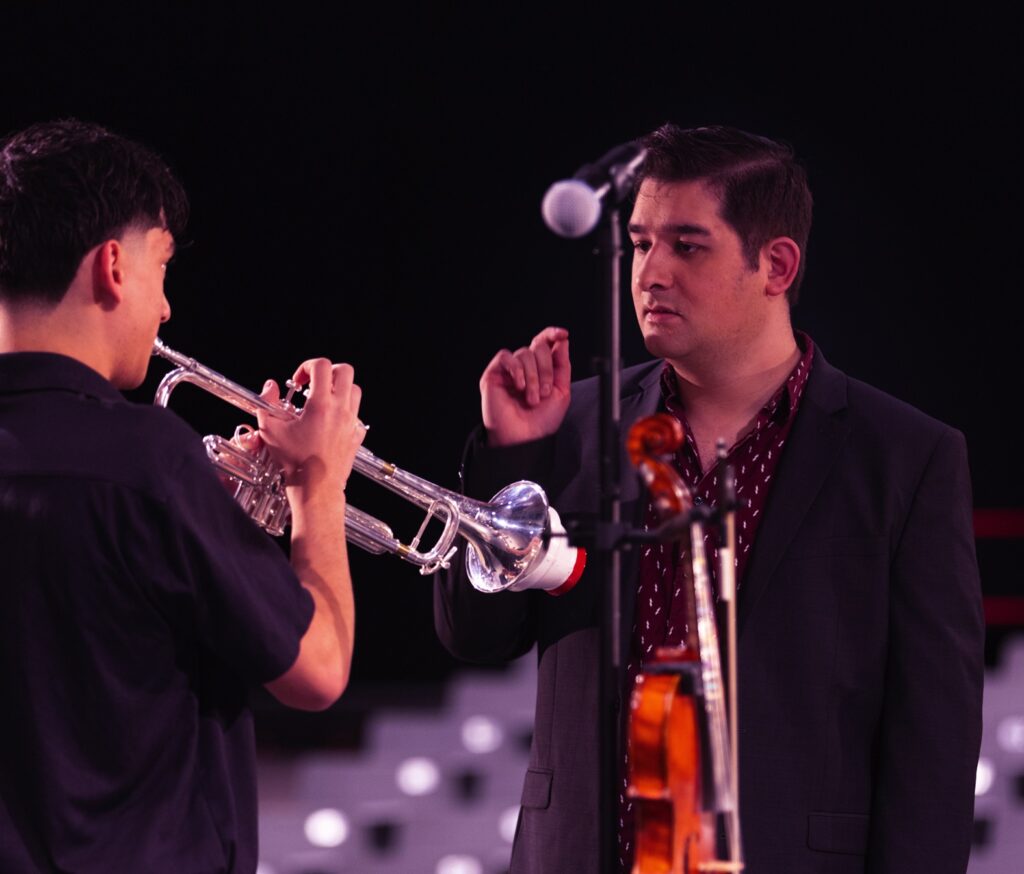Tagged Under:
Why Patience Wins Over Panic
It’s easy to think that kids don’t care, but with patience, repetition, praise and steady leadership, you’ll notice positive change.
“Do you even want to be here right now?” I asked the class. I didn’t yell it. I didn’t even say it in a particularly mean tone. It just slipped out — half honest question, half exasperated sigh — in the middle of a rehearsal where half the band wasn’t playing, a quarter was looking at their phones, and the rest were asking if we could “just skip this part.”
Most of the students shrugged. A few offered weak apologies. A lot of them didn’t even look up. Standing there, baton in hand, I felt that familiar pit in my stomach and thought: Why am I doing this?
This was during my third year of teaching, which might be harder than your first two years. In Year One, everything’s chaotic and you’re forgiven for it. During Year Two, you have some experience, so this should be easier, right? By Year Three, you’re supposed to have figured some things out. Spoiler: You haven’t.

They’re Not Starting Where You Are
If the kids weren’t engaged, I must be boring. If they weren’t practicing, I must have picked the wrong music. If they weren’t motivated, maybe I wasn’t inspiring enough.
Cue the spiral: Why am I doing this? I should quit before they realize I don’t belong here.
But the truth is a lot simpler (and less about me): Kids don’t arrive pre-motivated. Not for scale sheets. Not for breathing exercises. Not for your favorite John Mackey piece. Not even for a trip to Disney, if you’re offering one.
Kids arrive tired, distracted, overwhelmed, insecure, awkward, hormonal or all the above. They’re kids. That’s their job.
It’s our job to model what it looks like to care — over and over — until they catch on. For years, I kept waiting for some magical moment where a kid would walk in and say, “Wow, I just realized how important this is, and I’m ready to give 110%!” I know this won’t come as a shock, but I’m still waiting.
What I see now is that they’re watching me more than I realize. They watch and see how I show up on the boring days. How I react when things fall apart. How I treat the kid who’s not getting it. That’s what builds trust. That’s what keeps them coming back, even if they’re not showing it yet.

Set Clear Expectations and Repeat Them Without Apology
Early on, I thought I had to justify every rule. Like: “No phones because … research … cognitive load … respect … blah blah blah.”
Now? I simply say, “No phones. Put them away.”
Same with posture. Same with playing position. Same with rehearsal routines.
I used to think if I was clear once, they’d remember forever. I thought the problem was that my instructions weren’t inspiring enough. Nope. The problem was repetition — or my lack of it.
Think about it: I remind my own kids to brush their teeth every day, and they’ve been alive for over a decade. Why wouldn’t I need to remind a 9th grader to sit up and play with the right hand position?
One year, I made a laminated checklist for every section’s rehearsal responsibilities:
- Chairs straight
- Music in order
- Instruments out (not halfway out, not “almost out”)
- Phones away
It lived on the whiteboard. They rolled their eyes at it. I kept pointing to it. By October, it was working. Not because of the sign — because of the consistency.
You don’t need to turn your expectations into a tech manual. You just need to say it. Then say it again. And again. Not sarcastically. Not with resentment. Just like it’s normal. Because it is normal.
Showing up on time, getting your stuff out, actually trying — those are habits, not personality traits. And like any habit, they need reminders.

Celebrate Progress Louder Than Failure
You can’t guilt kids into caring. Not long term. I’ve tried. It just makes everyone feel bad and nothing gets better.
What works? Catching progress and calling it out like it matters. Because it does.
The first time my low brass section nailed an entrance they’d been late on for weeks, I stopped rehearsal and said, “Did you hear that? That’s what I’m talking about.”
They smiled. Not big, not dramatic. But enough. Enough to tell me: Okay. This matters.
Another time, I noticed that a clarinet player — one of my quiet, never-makes-eye-contact kids — had finally written in a tricky fingering after struggling with it for months. I didn’t make a big show. I just walked over after rehearsal and said, “Good job fixing that spot. That’s how you get better.”
Three weeks later? That same kid is marking their music more and helping younger players. Not because of my compliment. Because she started believing she could figure things out.
Kids won’t always tell you they care. But they’re watching for evidence that you notice when things get better. They need to feel like getting better matters to someone.
Side note: This is just as true for your seniors as it is for your 6th graders. They’re all looking for proof they’re moving in the right direction.

Don’t Confuse Apathy with Confusion or Insecurity
“I don’t care” is often code for “I don’t know how” or “I’m afraid I’ll look dumb if I try.”
I once had a percussionist who never seemed to engage. Always late, always zoning out, always with an excuse. I kept thinking, he doesn’t care. Turns out, he didn’t know how to read rhythms beyond quarter notes. He was terrified to admit it because he’d somehow faked his way through middle school band.
The minute we started breaking things down — literally writing rhythms on the board, clapping them together, building back from the ground up — his “I don’t care” started turning into “can we try that again?”
I’ve seen it too many times — kids checking out, not because they’re lazy but because they’re lost. They missed something early on — a fingering, a rhythm, a concept — and now they’re too embarrassed to ask. So, they sit back. They clown around. They roll their eyes.
And it’s easy to get frustrated. But if you pause and ask — really ask — “What’s holding you back right now?” you’ll often find it’s not attitude. It’s fear.
Try this trick: Watch who suddenly perks up when you model something slowly, or who lights up when you say, “I used to struggle with this part, too.” That’s where the work begins.

Patience Isn’t Weak. It’s Leadership.
There’s a version of the story where I blew up at that rehearsal described at the beginning of this article. Where I lectured, punished and stormed out. I actually lived that version, and I’m here to tell you that it doesn’t work.
What works is staying steady. Saying the same expectations calmly. Noticing small wins. Asking better questions. Modeling what care looks like when no one else is giving it back yet.
This isn’t easy. I’ve gone home plenty of days thinking: Maybe I’m just bad at this. I’ve sat in my car wondering if today was the day a kid would finally decide that band was stupid because I didn’t handle it well.
But here’s what I’ve seen: The teachers who last and the music programs that thrive aren’t the ones with the biggest trophies or the flashiest shows. They’re the ones where patience is baked into the culture. Where kids are allowed to grow up a little slower. Where failure isn’t met with shame but with, “Okay, let’s try again.”
Patience isn’t weakness — it’s leadership. It’s knowing that these moments — the phones-out, horns-down, eyes-glazed-over moments — are temporary.
What’s permanent is the example you’re setting. And that example? It’s starting to stick. Even if you can’t see it yet.















